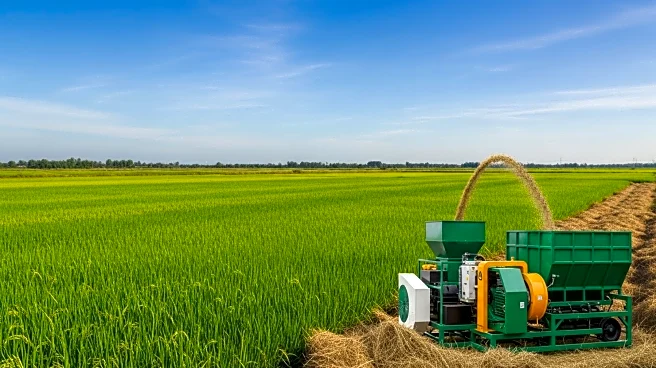What is the story about?
What's Happening?
Vietnam is transforming rice straw, traditionally a waste product, into a valuable resource through a circular economy model. This initiative was highlighted during a Farmers’ Field Day in the Mekong Delta, organized by the Department of Crop Production and Plant Protection of Can Tho City, in collaboration with the International Rice Research Institute (IRRI) and the Vietnam Rice Industry Association (VIETRISA). The event showcased techniques for cultivating straw mushrooms and producing organic fertilizer from rice straw, attracting around 300 farmers and delegates. The program, part of the 'One Million Hectares of High-Quality and Low-Emission Rice Program,' aims to reduce the environmental impact of rice farming while increasing farmer income. The initiative has led to the creation of sustainable business models, improved farmer training, and increased rice yields.
Why It's Important?
This initiative is significant as it addresses both environmental and economic challenges in rice farming. By converting rice straw into a resource rather than burning it, the program reduces pollution and greenhouse gas emissions. Economically, it provides farmers with additional income streams and reduces reliance on chemical fertilizers. The success of this model could serve as a blueprint for other regions facing similar challenges, promoting sustainable agricultural practices. The program's emphasis on training and capacity building ensures that farmers are equipped to adopt these new methods, potentially leading to widespread adoption and long-term benefits for the agricultural sector.
What's Next?
The program's success has prompted calls for supportive policies and incentives to further facilitate the adoption of circular economy practices. Local governments and agricultural sectors are encouraged to provide financing for necessary machinery and strengthen value chains connecting farmers with businesses. The use of digital tools, such as the IRRI-developed Easy Farm App, is recommended to streamline transactions. Continuous technical support and knowledge-sharing initiatives are also planned to sustain and expand the program's impact. These steps aim to enhance the program's reach and effectiveness, ensuring its benefits are realized across Vietnam's rice production industry.
Beyond the Headlines
The shift towards a circular economy in rice farming has broader implications for environmental sustainability and economic resilience. By reducing pollution and creating new income opportunities, the initiative contributes to a more sustainable agricultural model. It also highlights the potential for similar approaches in other sectors, encouraging innovation and collaboration between government, research institutions, and farmers. The program's success underscores the importance of integrating environmental considerations into economic planning, paving the way for more responsible and sustainable development practices.
















